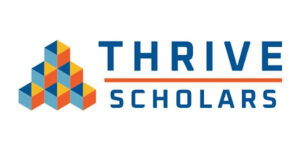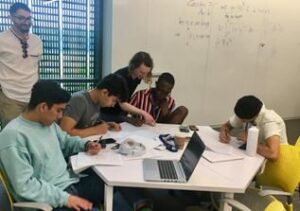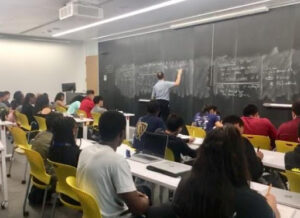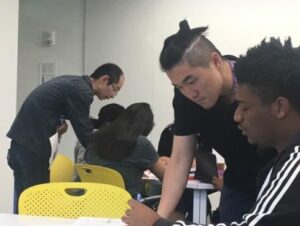 THRIVE SCHOLARS helps high-achieving, low-income,underrepresented junior and senior high school students to get into and graduate from top colleges equipped to reach their full career potential. We aim to overcome the unique barriers our Scholars face to enrolling in and succeeding at selective colleges: their need for more informed college admissions advising; their inadequate academic preparation; their lack of professional mentors and experience; and their lack of access to a network for key internships and jobs.
THRIVE SCHOLARS helps high-achieving, low-income,underrepresented junior and senior high school students to get into and graduate from top colleges equipped to reach their full career potential. We aim to overcome the unique barriers our Scholars face to enrolling in and succeeding at selective colleges: their need for more informed college admissions advising; their inadequate academic preparation; their lack of professional mentors and experience; and their lack of access to a network for key internships and jobs.
Vision
We envision a world in which low-income students of color attend highly selective colleges and graduate with the same opportunities as their higher income peers, where the STEM workforce and corporate board rooms are reflective of the diverse population of the United States, and where low-income students of color feel empowered to make lasting positive change in their communities. We provide Scholars with admissions guidance and intensive academic preparation before college and academic, personal, social-emotional, financial, career development, and professional support during college. http://www.thrivescholars.org

History
Thrive Scholars was established in 2001, originally as a scholarship program called South Central Scholars (SCS) serving a few students in Los Angeles. We quickly realized the demand for a multi-stage, integrated program of support, and began supporting students throughout college with academic and social-emotional support and career guidance and networking. Within a few years, we achieved impressive results: 90% of Scholars who were attending very selective schools like Harvard and USC were graduating within 6 years.
Although our Scholars were graduating at rates far beyond the national average, a large percentage were unable to find jobs upon graduation that matched their passions. After reviewing their college transcripts, it became clear that, despite having excelled in high school, many Scholars were entering college without the college-level writing and math skills needed to persist in their chosen majors and were being forced to transition to less demanding majors. They were graduating, but with degrees that didn’t interest them and career options dashed.
To reverse this trend, we launched Summer Academy in 2012 to offset the discrepancy in academic preparation between our students and those from more affluent schools so that Scholars are able to persist in STEM and other rigorous majors. After the implementation of these new programmatic innovations, the results were overwhelming; our Scholars were attending top colleges at much higher rates than their peers and Scholars pursuing STEM majors were much more likely to persist and graduate in their major compared to similar students.
In 2014, our founders replicated the program in Boston as a pilot for further regional, and eventual national, expansion. After three years of successful outcomes in Boston, we merged to form one organization. Thrive Scholars now serves the top underrepresented students from all across the country.

Activities
Our six year-long program provides a continuum of support for our students throughout the entire life-cycle of higher education – beginning their junior year of high school through college and into their first job.
Prior to college, Scholars benefit from:
- Summer Academy, our cornerstone program, a 6-week rigorous academic preparation program that takes place in a residential setting at Amherst College for all rising seniors in high school and at the University of Southern California (USC) for all rising college first years.
- 210+ hours of instruction in college-level writing, math, and other STEM courses taught by college professors. Summer Academy is designed to offset the discrepancy in academic preparation between our students and those from more affluent schools so that Scholars are able to persist in STEM and other rigorous majors.
- A laptop to facilitate learning and participation in assignments, which Scholars keep after completion of the first Summer Academy to ensure they have access to technology necessary to thrive in college.
- College counseling educates students about the application and financial aid process with an emphasis on selective colleges. Students receive tailored guidance to ensure that they apply, gain admission to, and attend best fit, top-ranked universities.
Once in college, Scholars receive:
- Individual College Support: help for Scholars struggling academically or socially/emotionally through individual planning and accessing campus resources.
- Career Coaching: a dedicated career coach to help our Scholars one-on-one to build resumes, write and edit cover letters, prepare for interviews, and develop hard and soft career skills.
- Professional Network: access to an extensive internship and job network in fields such as medicine, the life sciences, law, and finance. Our network includes numerous Fortune 500 corporations.
- Mentorship: one-to-one professional mentors for support, guidance, and career exposure.
- Bridge Stipend: four-year bridge stipend of $1,000 per year.
Audience Served
We serve high-achieving, low-income students who are either students of color or who are the first in their family to attend college. We admit students who have proven themselves academically in high school with a strong GPA (3.5+) and high SAT scores (1100+) that are necessary to gain admission, but not sufficient for strong performance at top colleges. Our most recent class of admitted Scholars had an average high school GPA of 3.93 out of 4.0.
Our Scholars represent our diverse community, with students coming from all across the U.S. For example, for the Massachusetts students currently enrolled in our program, 26% identify as Asian, 49% identify as Black or African American, 16% identify as Latinx, and 5% identify as Hawaiian/Pacific Islander, and 6% identify as white. Our Scholars fall at or below the low-income status and tend to be the first in their family to attend college. 84% identify as first-generation college students and their average family income is $36,874.

Successful impact
Our most recent cohorts of students have achieved outstanding outcomes as a result of our programs:
- More low-income students of color attend selective colleges. For our most recent cohort Scholars who were admitted to college, 91% are attending top 100 colleges, 82% are attending top 50 colleges, and 29% are attending Ivy League or similar schools.
- More low-income students of color graduate ready for top flight colleges and careers. Our innovative Summer Academy helps to ensure our students have the skills they need to persist and graduate in the major of their choice. The Academy equips students with the writing and math skills their better-resourced peers have and skills needed to excel in their first-year courses. As a result, our Scholars have an average first-semester GPA of 3.25 and the average GPA at graduation for our Scholars is 3.2.
- 98% of our Scholars graduate from college, compared to 80% for similar students. And, they are 10% more likely to graduate than the general population at their schools.
- 65% of Summer Academy participants are able to persist and graduate in STEM and other rigorous majors compared to less than 25% for similar students. Impressively, our Scholars are 15% more likely to persist in these majors compared to the general population at their schools.
- Students graduate with an average student loan debt of less than half of the national average.
2020 Update:
Thrive Scholars have all received their college admissions, and they will be going to amazing schools:
- 38% are going to schools ranked in the Top 10 nationally, 44% to Ivies+(Ivy League Schools, plus Duke, UChicago, MIT and Stanford), 62% to Top 25 schools, 84% to Top 50 schools, 92% to Top 100 schools.
- The five schools that are taking the most Thrive Scholars are: Tufts (8), Harvard (7), MIT (7), Brown (7), and Penn (6). Following right behind are Cornell (4), Pomona (4), Stanford (3), USC (3), and Wellesley (3).
- Boston graduating seniors: 43% are going to Top 10 schools and 95% are going to Top 100 schools. The five schools that are taking the most Boston students are Harvard, Princeton, Brown, Tufts, and Boston College.
Response to virus pandemic:
We are adapting and innovating our program in response to this crisis, working around the clock to answer the immediate and long-term needs of our Scholars and continue our mission of preparing underrepresented students to thrive in college and career. We’ve already distributed over $100,000 in funds to support students with emergency transportation, lost wages from the disappearance of work-study jobs, technology needs to access online learning platforms, and food support. Early on in the crisis, we shifted our 2020 Summer Academy programs for this summer to a virtual platform, with some structural changes to accommodate students who are spread out among multiple time zones, and we expect full participation. We hired an experienced education technology firm to help design the best platform to provide these talented students with the same rigorous academic courses, college guidance counseling, and career development training that we are known for. Finally, we are providing one on one virtual coaching and counseling to all of our Scholars to help them navigate this unsettling time.
Recommendations for Replication and/or Adaptation
While our program spans multiple phases over the course of six years, there are a number of key learnings that are replicable or adaptable in other settings:
- Treating students holistically and individually – Many programs craft interventions that apply the same guidance to all students. Our approach to serving our Scholars is infused with the idea that each student’s path is unique. We apply this method to financial aid counseling with students and their families. In order to ensure that students achieve their full potential, we recommend creating a structured, one-on-one coaching system for college guidance that builds on the individual interests and strengths of each student. By leveraging a student’s uniqueness and working with an individualistic mindset, you can ensure that each student attends a “best-fit” affordable college.
- Expanding students’ worldview – High school students often come to the table with ingrained ideas about the college landscape that, oftentimes, can be parochial or narrowly focused based on the sometimes limited exposure they have had in their communities. We work hard to expand the horizons for our Scholars when they are considering colleges. For example, they typically know about the state schools close to them and the one or two big universities in their areas, along with the few schools that appear in the media. We intentionally expose our students to colleges like Amherst College (where we hold our first Summer Academy) to open their eyes to a whole world of small liberal arts schools that may not be on their radar but offer great academics and significant financial aid opportunities. During Summer Academy, we also bring our Scholars to a diverse array of other schools to expose them to a variety of settings – rural/urban, large/small, public/private, etc. We recommend organizing campus visits to provide students with experiential exposure to colleges of various types.
- Group-based support in foundational areas – Our Summer Academy is built on the idea that students from underresourced communities – even the highest achieving ones – often enter college with academic deficits compared to their more affluent peers on campus. Our solution of providing intensive academic instruction in math and writing to our Scholars acknowledges that these are foundational building blocks for every college major. Once students arrive on their college campus, professors teaching STEM courses like engineering, physics, or biochemistry expect students to be proficient in calculus – remedial instruction is rarely available. Similarly, social science and liberal arts programs assume that students have the skills needed to write in a sophisticated manner. Additionally, rather than provide students with grades, we focus on content mastery and use a collaborative, group-based approach that encourage students to invest in each other rather than compete for grades. We recommend providing students from under resourced communities with additional writing and math instruction as they prepare for college in a group-based setting without grades that is designed around a cohort of students that seeks to support each other educationally.
- Starting early with defined deliverables – Over the past two years, our Summer Academy has shifted from a day program to a residential program. While there are many advantages to this approach (such as the opportunity to build cohort communities, more time to add additional sessions on leadership development, and social-emotional support), one of the best outcomes has been the opportunity to begin our college guidance work earlier with students so that when they return to their high school in September, they are armed with a final draft of their personal statement, a final draft of their college list, and a completed Common Application. As a result, they are much more likely to apply early action or early decision (which often increases the chances for admission). Our Scholars report that they feel like they are far ahead of their peers, which reduces their anxiety inherent in the college application process. Structuring one-on-one college guidance coaching so that students complete the bulk of their work before the start of senior year is a great way to ensure that students feel prepared to leverage all of the options available to them.
- Continuing support post high school – Many students in programs offfering pre-college support can use additional guidance and supports during their college years. Their challenges often go beyond academics, and their social and emotional needs can be reinforced when necessar
Contact Info
Thrive Scholars
Karen Williams, Chief Program Officer
kwilliams@thrivescholars.org
(310) 833-1670
http://www.thrivescholars.org
